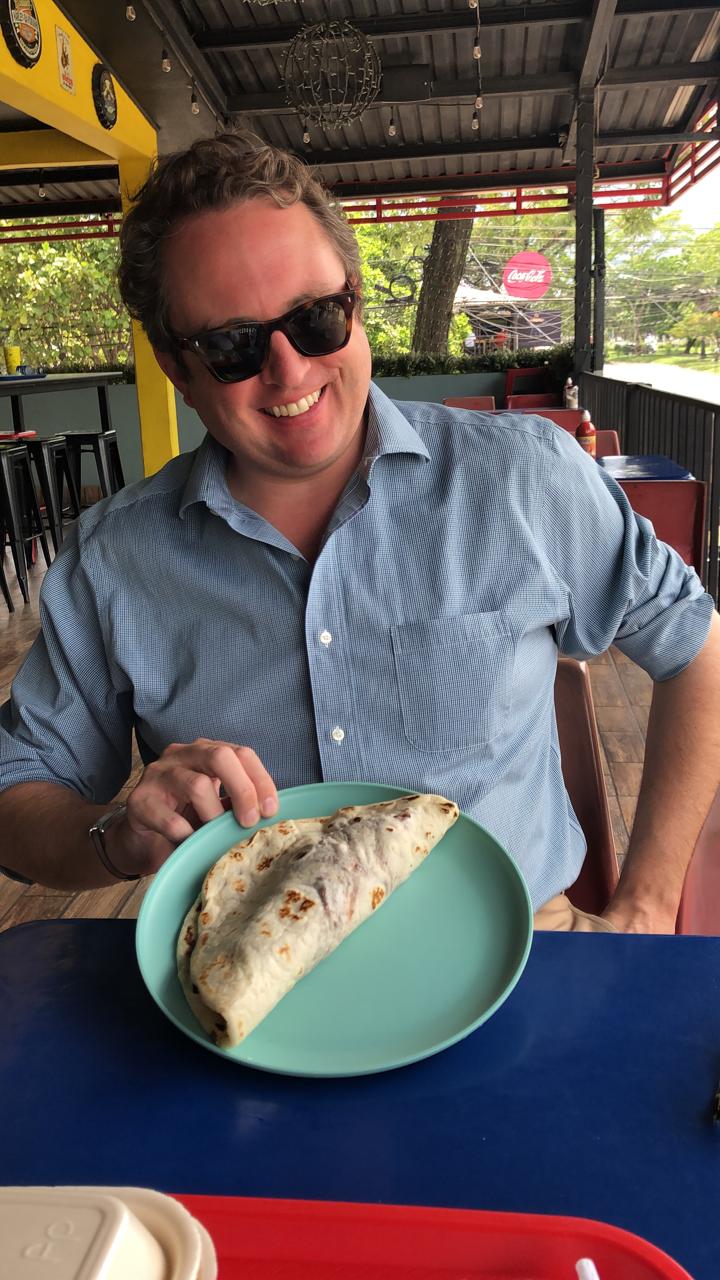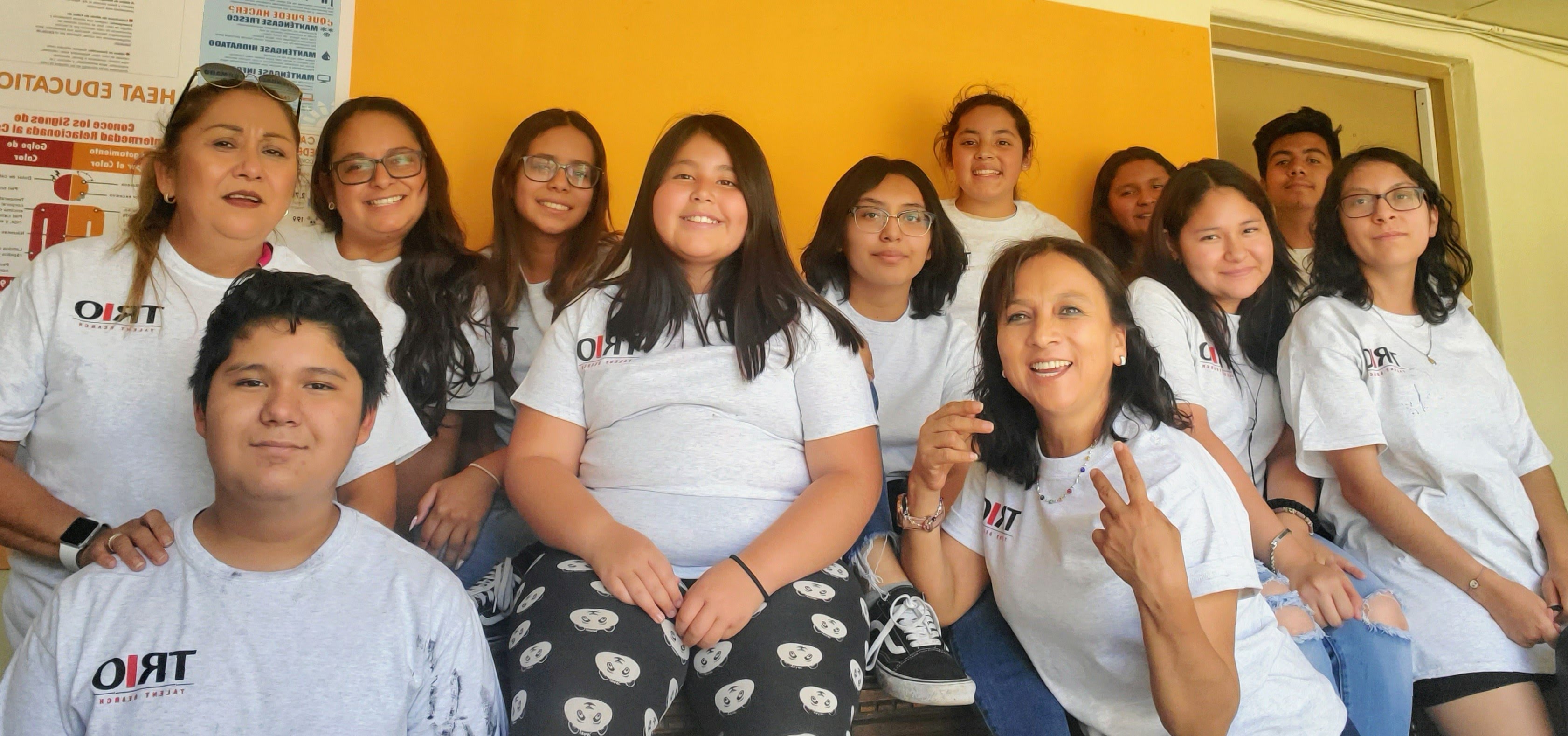School of International Letters and Cultures faculty stay busy over summer break

Kwale County, Kenya, Gov. Salim Mvurya (right) and a representative from social services and talent speak with Nina Berman (second from left) and Eileen Wilson.
Faculty members in Arizona State University's School of International Letters and Cultures kept busy over the summer by not only preparing their syllabi for the fall semester but also presenting and publishing their research, earning professional credentials and traveling abroad.
Pamela Howard, a lecturer in American Sign Language, completed a Langue des Signes Française (LSF) class in preparation for her upcoming study abroad trip to Paris in May, “American Sign Language: The French Connection.”
“Although American Sign Language is related to LSF, there are more differences than similarities,” Howard said. “I learned that French deaf people fingerspell a lot less than American deaf people; while similar, their manual alphabet differs in the letters f, g, h, m, n, t, x and y.”
School of International Letters and Cultures Director Nina Berman returned to her research location in Kwale County, Kenya. She completed work for an article on ecoliteracy and — in partnership with ASU colleagues Netra Chhetri, Okey Iheduru, and Salah Hamdoun — performed research for a collaborative project on the economic impact of COVID-19.
She also conducted interviews for a study on the economic lives of Kenyans across a variety of professions and met with Kwale County Gov. Salim Mvurya to discuss her projects.
Ligia Bezerra, an assistant professor in Portuguese, worked with a group of female scholars from across the United States on a bilingual publication of poems by female Brazilian writers. The forthcoming publication is an initiative of the Mulherio das Letras - USA (Women of Letters) group, which Bezerra co-founded in 2019 as an extension of a Brazilian movement to promote publishing literature written by women.
Clinical Assistant Professor of Brazilian studies Glen Goodman gets ready to eat his first baleada — a traditional Honduran food consisting of a thick flour tortilla, beans, eggs, cheese and avocado.
“The translation will be an excellent resource for faculty teaching Brazilian literature and culture in English,” Bezerra said. “English translations of Brazilian literature, especially written by noncanonical writers, are limited in number so this translation will help bridge this gap.”
Clinical Assistant Professor of Brazilian studies Glen Goodman traveled to Honduras, Guatemala and El Salvador to meet with universities, government representatives, nongovernmental organizations, development implementers and other stakeholders as part of his involvement with the universitywide Central America Working Group. He also presented his research on ethnic food and tourism in southern Brazil at the Association for the Study of Food and Society’s virtual conference titled “Just Food: Because It Is Never Just Food.”
Finally, Goodman learned that he had been awarded a Fulbright-Hays Program grant to bring a dozen K–12 teachers from the Osborne and Phoenix Union school districts to Brazil next summer. That project’s goal is to create Brazilian studies and Portuguese modules for primary and secondary school curricula.
Sara Lee, a lecturer in German, was one of nine people in the United States selected to complete training to become a national Goethe-coach. She will soon be able to travel the country to provide curriculum support and classroom visits to German teachers at any level. The program, sponsored by the German Federal Ministry for Economic Affairs and Energy, is a collaboration between the American Association of Teachers of German and the Goethe-Institut.
“The most rewarding aspect of the training was definitely the intense collaboration and exchange with amazing fellow German teachers here in the U.S. who went through the training with me,” Lee said. “I worked with enthusiastic teachers who are top-notch in the area of teaching German and teaching pedagogy.”
School faculty members and students provided lessons in Portuguese and Italian to a group of 86 middle school and high school students participating in the nonprofit Friendly House’s TRiO Talent Search college and career readiness program. The ASU organizers instructed students on elements of both language and culture. Many of the youths were heritage Spanish speakers and found the lessons relevant to their experiences, knowledge and interests.
Over the summer, School of International Languages and Cultures faculty members and students provided lessons in Portuguese and Italian to middle school and high school students participating in the nonprofit Friendly House’s TRiO Talent Search college and career readiness program.
Clinical Assistant Professor of Spanish and Director of Spanish Language Acquisition Hope Anderson presented her research at two conferences. First was the International Association for Language Learning Technology conference, which was held virtually. Anderson presented with her colleagues Steven Flanagan, Anne Walton-Ramirez and Kristin Elwood on the topic of “Implementing Synchronous Virtual Sessions in Online Language Courses.”
Second was the American Association of Teachers of Spanish & Portuguese conference in July in Atlanta. Anderson’s presentation, “Abierto y Gratis: Developing Proficiency with All Digital Resources,” was based on a project she carried out in her Spanish classes.
“It was energizing to attend in-person sessions and share ideas with other language professionals who are tackling some of the same issues that we are at ASU with classroom activities, second language and heritage learners, textbook materials, assessment and more,” Anderson said.
These are just a few examples of the teaching, research and service activities completed by School of International Languages and Cultures faculty members over the summer. The professors look forward to carrying these experiences with them into the fall semester as they share what they have learned with their students and work to further enrich language and culture learning at ASU.
More Arts, humanities and education

From ASU to the open road: Alumna Gabriella Shead builds a career behind the scenes of Broadway tours
For ASU alumna Gabriella Shead, a career in the theater isn’t about taking center stage — it’s about making sure everything…
Canon brings ‘Star Wars’ cinematographer to inspire Poitier Film School students
David Klein never had a mentor.He was scrappy — and lucky — enough to succeed without one as a career cinematographer. His…

Illuminating the season: How a business professor turns holiday lights into lessons on creativity and sustainability
On a December night in Chandler, Arizona, Kevin Dooley’s house doesn’t just twinkle. It beams like a beacon at the end of…



